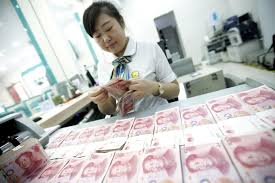China scores victory in containing financial risks in 2019

Beijing: China has tackled major financial risks with all-out efforts and a deft hand in the past year, as existing hazards have been gradually dissolved and a more mature system put in place to forestall potential dangers.
China’s financial risks gradually abated after a few years of fast accumulation, as the country deals with exposed risks and improves the financial regulation system to steer clear of systemic risks, said a report on China’s financial stability in 2019 by the People’s Bank of China (PBOC), the central bank, China Economic Net reported.
Among the most notable achievements, the leverage ratio was stabilized, the country’s shadow banking assets at the end of June shrank to the lowest level since the end of 2016, and the legitimate interests of clients were protected during the takeover of Inner Mongolia-based Baoshang Bank to contain its credit risk.
Financial institutions are building up risk resistance, with commercial banks’ provision coverage ratio, a measure of funds set aside to cover bad loans, at 187.63 percent by the end of the third quarter and the solvency adequacy ratio of China’s insurance firms remaining within the reasonable range by late last year.
Noting that China’s financial system is generally healthy and capable of defusing various risks, the annual Central Economic Work Conference urged continued efforts to keep the leverage ratio stable in 2020.
In the homestretch to winning the battle against financial risks by 2020, the country is prepared to effectively forestall risks and in the meantime improve the financial system for stronger resilience.
In the past year, China has reined in exposed financial risks regarding small and medium-sized banks and prevented them from spilling over.
No bank runs occurred after the May takeover of Baoshang Bank by the PBOC and the China Banking and Insurance Regulatory Commission (CBIRC), and debt repayment and transfers have been completed for big institutional and interbank clients of the lender.
The PBOC conducted open market operations and used medium-term lending facilities to restore liquidity among small and medium-sized banks affected by the incident.
“Commercial banks, including small and medium-sized ones, have maintained profit growth with their risk level basically under control,” said Lu Zhengwei, chief economist at Industrial Bank.
Official data showed more than 99.2 percent of small and medium-sized banks passing the required liquidity threshold by the end of the third quarter.
The PBOC said it will continue to closely watch the liquidity levels of small and medium-sized banks and offer more policy support for their sustainable development.
The CBIRC will replenish capital for smaller banks and urge them to dispose of non-performing loans, said Yang Liping, an official with the commission.
The country’s financial watchdogs have sought to strengthen weak links in regulations to prevent risks in 2019 in an active effort to forestall risks.
The government has rolled out interim regulations for the credit rating industry and started soliciting public feedback on trial measures on the supervision of financial holding companies as well as the evaluation of systematically important banks.
Tightened regulations sped up the exposure of commercial banks’ non-performing assets and pushed them to make more efforts to get rid of bad loans, resulting in 176.5 billion yuan (about 25.3 billion U.S. dollars) more in bad loans disposed of in the first three quarters than the same period of 2018.
As another fixture of the safety net against risks, China’s deposit insurance fund played a critical role in safeguarding the assets of Baoshang Bank’s individual, institutional and interbank clients.
The PBOC report on China’s financial stability called for efforts to improve the legal framework of risk control for financial institutions and advance amendments to laws and regulations on corporate bankruptcy and commercial banks.
Serving the real economy and fending off financial risks rely on deepening financial reform and opening up for institutional support, said the State Council’s financial stability and development committee during its 10th meeting in November.
The capital market reform is a highlight of China’s endeavors to improve the financial system where the upcoming adoption of a registration-based IPO system and the now piloting spin-off listings are expected to improve the quality of listed companies.
Meanwhile, China’s financial opening-up efforts, especially measures to pilot the cross-border transfer of non-performing debts, have paved the way for foreign capital to enter the country’s non-performing asset industry and help free up more credit for small and micro enterprises and the private sector.
The country’s real economy is benefiting from endeavors to optimize the financial system, with newly added social financing in the first 11 months rising 3.43 trillion yuan from the same period in 2018.
The October tone-setting fourth plenary session of the 19th Central Committee of the Communist Party of China urged the establishment of a modern financial system featuring high adaptability, competitiveness and inclusiveness, as well as an institutional shield against financial risks.
In a modern financial system, risks can be discovered, diverted or prevented in time, said Guan Tao, former spokesman of the State Administration of Foreign Exchange.





